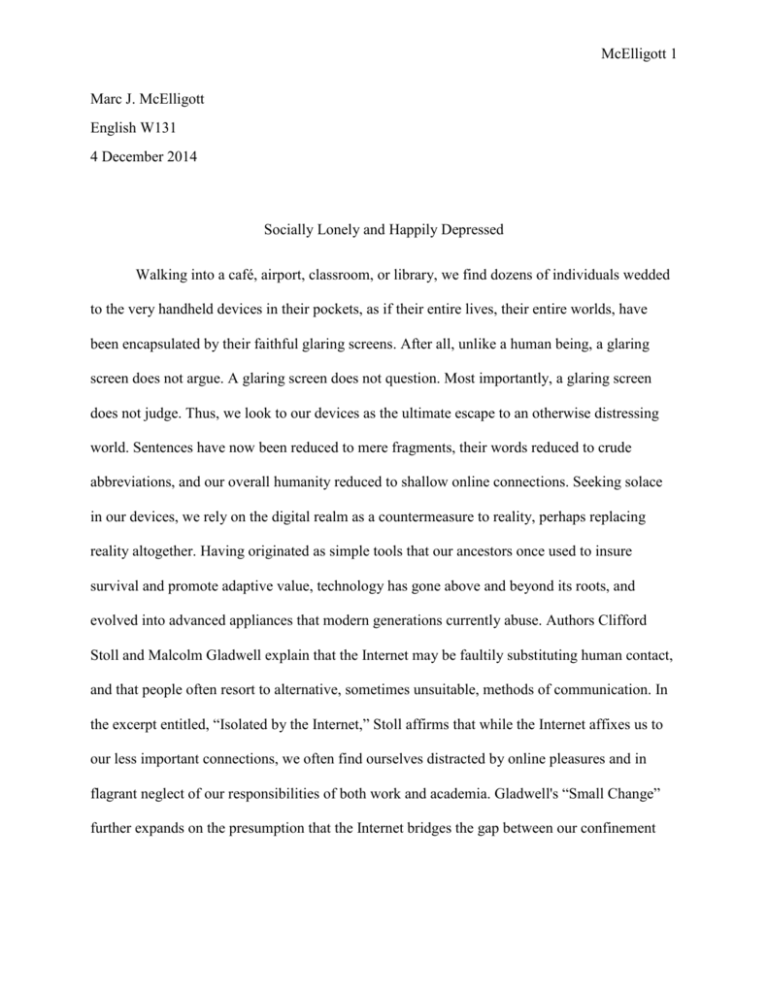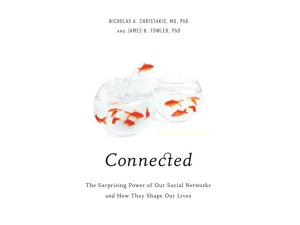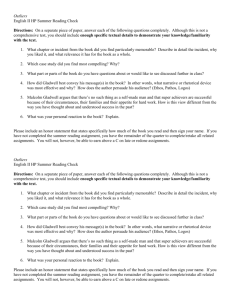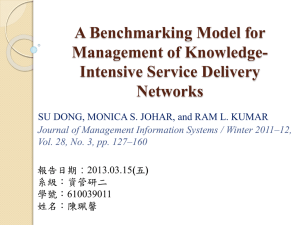Marc McElligott
advertisement

McElligott 1 Marc J. McElligott English W131 4 December 2014 Socially Lonely and Happily Depressed Walking into a café, airport, classroom, or library, we find dozens of individuals wedded to the very handheld devices in their pockets, as if their entire lives, their entire worlds, have been encapsulated by their faithful glaring screens. After all, unlike a human being, a glaring screen does not argue. A glaring screen does not question. Most importantly, a glaring screen does not judge. Thus, we look to our devices as the ultimate escape to an otherwise distressing world. Sentences have now been reduced to mere fragments, their words reduced to crude abbreviations, and our overall humanity reduced to shallow online connections. Seeking solace in our devices, we rely on the digital realm as a countermeasure to reality, perhaps replacing reality altogether. Having originated as simple tools that our ancestors once used to insure survival and promote adaptive value, technology has gone above and beyond its roots, and evolved into advanced appliances that modern generations currently abuse. Authors Clifford Stoll and Malcolm Gladwell explain that the Internet may be faultily substituting human contact, and that people often resort to alternative, sometimes unsuitable, methods of communication. In the excerpt entitled, “Isolated by the Internet,” Stoll affirms that while the Internet affixes us to our less important connections, we often find ourselves distracted by online pleasures and in flagrant neglect of our responsibilities of both work and academia. Gladwell's “Small Change” further expands on the presumption that the Internet bridges the gap between our confinement McElligott 2 and our company, but emphasizes that constructing our circle of friends solely around these less important connections mitigates our determination to change the world. Conversely, Sherry Turkle’s “Connected, but Alone?” TEDTalk focuses on the contention between handheld devices and relationships -- machines and sentiments -- revealing that we may regrettably be losing touch the more we keep in touch with our devices. Here, one begins to suspect that mankind has possibly fallen under control of its own creations. The Internet admittedly grants the swift attainment of information by linking us to associates who are not usually within our grasp in the physical world. Additionally, we find ourselves comforted by social media’s entertainment and leisure, yet discouraged by its overwhelming appeal. Even so, the Internet is found in countless devices, which seem to fulfill the status quo of American society. As we depend on the Internet by increasing degrees, we fall lazily fall short in reaching goals and managing responsibilities and intimacy also becomes seriously complicated by couples’ tendencies to resolve their uncomfortable feelings through text messages rather than face-to-face. Along these lines, our computer-centered race could be headed in a bleak direction so long as we continue to rely on our devices for escape, and ignore the things that truly matter outside of our fantasies. While it is important to sustain close friendships to fulfill our need for belonging, technology plays a vital role in fulfilling different kinds of needs. To start, information comes in many different forms, ranging from government publications to Sally’s textual reminder that the pizza is finally in the oven. Tediously writing in blotchy ink, sealing messages in paper envelopes, and finally mailing them out across a span of miles is time-consuming and potentially risky. This problem occurs even when, say, our heartfelt letters to our children in Iraq are lost in the confusing mix of thousands others, each one written by concerned parents who also wish to send away their love. The responsibility of our weakest connections, namely mail services or McElligott 3 college advisors, is to then follow through with information and insure that our words get out. Oppositely, our most solid and dependable connections can’t always exist online. According to Stoll, a U.C. Berkeley astronomer and author, connections have long been formed before the original conception of the Internet. Suffering from an unexpected loss, we’ve previously turned to close family relatives and cherished friends to get us through our pain. Now, we resort to Internet services to achieve identical goals. When referencing Carnegie Mellon University psychologists Robert Kraut and Vicki Lundmark, Stoll conceded that the Internet yields serious, long-term negative effects on social stability. To Kraut and Lundmark, there exists two human links distinctly set apart from each other: deep social ties and weak ties. While deep social ties entail regular human contact and steadier relationships, weak ties “have superficial and easily broken bonds” yet “link us to information and social resources outside our close local groups” (Kraut and Lundmark qtd. in Stoll 649). Even supposing that strong ties breed better social outcomes altogether, weak ties are found in greater abundance in that they allow us to confide in anonymity, and require little effort to develop and little effort to preserve. Thus, online friends are the most disposal because communication is easily severed and information is easily attained. Like the car mechanic whose job is to fix, but never to rebuild, weak ties cannot meet the same expectations that our strong ties can, and therefore fail to uphold friendship’s clockwork. Ascribing deep social ties as an integral component of activism, Gladwell, best-selling author and writer for the New Yorker, reports that a chain of protests persisted for years past 1960. What began as a sit down at a lunch counter in the town of Greensboro eventually became known as the start of the Civil Rights Movement. Having been planned and finally executed by four college students who knew McElligott 4 each other well, individuals who restrict themselves to the Internet could not possibly display their same devotion. However, there is still strength to be found in weak ties, as Gladwell notes from psychologist Mark Granovetter that even our acquaintances “are our greatest source of new ideas and information. The Internet lets us exploit the power of these kinds of distant connections with marvelous efficiency” (234). In that event, technology plays a vital role in linking us to information our normal circle of friends, whose jobs are to principally fulfill our need for belonging, cannot provide. And yet, we still appear to value our own comfort over the presence of others, online and in person. Human beings like to achieve a sense that their world is predictable and most of all, comfortable. Condemning boredom, we take full advantage of our electronics so as to keep us occupied for the remaining time. Feeling tired from the workplace, we may even immediately turn on the television set in an attempt to forget the day’s events, and, by the next morning, repeat the cycle. Social media, then, abates unwanted feelings like stress or boredom, and acts as a temporary cover to the harshness of the real world. However, comfort is taken to great lengths when one’s supposed luxuries pervade their underlying convictions. When explaining that technology, particularly the Internet, instills noticeable comfort and ease within our lives, Stoll also explains that its varying degrees of distractibility are inversely making our goals harder to reach than ever before. Stoll writes, “As connection speeds increase, college students spend more time surfing the Web, and less time writing, studying, or whatever they don’t want to do. An Internet link is a license to goof off” (654). Equipped with the belief that entertainment comes before responsibility, college students and office workers unjustifiably suspend themselves in apparent inactivity, free from having to abide by the recurrent demands of McElligott 5 their instructors and employers. For this reason, one of technology’s centralized shortcomings is its enabling of procrastination, whereby the immediate pleasures of the present outweigh the prospective rewards of the future. YouTube videos, discussion forums, instant streaming services, and video games embody a large portion of social media’s appeal, for they are captivating and enjoyable to all ages and races. Without recognizing the incentive to accomplish tasks necessary for success, social media’s comfort will always supersede productivity and, in consequence, foster sedentary living. The article entitled, “Laziness Will Send Us to an Early Grave” by Richard Weiler, Ph.D, and Emmanuel Stamatakis, Ph.D, two leading experts on sports and exercise, professes that human beings, whose bodies were originally designed by evolution to move around constantly, engage in sedentary living, and that technology is chiefly accountable for their ongoing inactivity. While many rationalize social media as an escape from understandably stressful circumstances, others treat it as though it were its own religion. Weiler and Stamatakis acknowledge: “science and technology have undoubtedly made our lives easier,” but criticize our sedentary habits as the cause of “more than 40 medically recognized chronic diseases, such as coronary heart disease, type 2 diabetes, obesity, mental illness, dementia, and some cancers” (Weiler & Stamatakis). In other words, while technology makes some things easier, it ultimately contributes to significant health-related issues. Our need to survive should hold as much importance as our need to achieve financial success or excel in academics. Instead, as social media grows, our activeness shrinks, with the goal of survival, too, becoming impaired by the unbroken state of lethargy. This causes an interference in our drive to achieve, and in shockingly frequent cases, an interference in our own relationships. Because social media extends to such a wide variety of technological appliances, escape isn’t always the immediate option when even our most personal encounters are hampered by McElligott 6 troublesome little handheld devices. Edward Thorndike, an American psychologist, once theorized that the more a specific behavior is rewarded, the more the behavior is likely to be repeated. This “law of effect” spans out to thousands of citizens transitioning over to smartphones every day, whereas these so-called social shields defend against uncomfortable situations, feelings, and confrontations, and manufacture future behaviors. When it comes to the modern dating scene, a smartphone is viewed as essential to a relationship, although text messages complicate our capacity to embrace intimacy. Many even consider communication via text as a wholly acceptable means to reciprocate intimate feelings because it conveniences both parties, and largely satisfies the status quo that everyone should own an electronic device. After conducting heavy research on the dynamics between humans and technology for 15 years, Sherry Turkle, Ph.D, elaborates on the premise that social media further distances us from each other. Originally, Turkle’s belief was that digital knowledge would prompt a better understanding of the real world and our personal identities, but that belief rebounded when technology turned into a socially acceptable form of an unhealthy addiction. Friends and family deny attention to one another by engrossing themselves in their miniature computers, oblivious to their surroundings and unconcerned with the feelings of others. One possible rationale for this type of behavior would be the preference for amusing distractions from unpleasant feelings such as loneliness, grief, or general discomfort. However artificial it may seem, though, we’ve discovered an optimum protection. During her speech, Turkle states:“Technology appeals to us most where we are most vulnerable. We’re lonely but we’re afraid of intimacy. We turn to technology to help us feel connected in ways we can comfortably control” (Turkle). Again, the law of effect comes into play: viewing intimacy as a threat when the fear of things never working out face-to-face extinguishes appropriate behaviors, leaving the inappropriate behaviors to occur in great McElligott 7 frequency, and in even greater numbers. Nevertheless, relief is at hand. In the article “How Smartphones Could Be Ruining Your Relationship,” published author and certified life coach Barry Davenport capitalizes on Turkle’s initial argument, but reasons that the absence of smartphones, especially between two partners, should relieve anxiety, not brew it. Davenport writes, “We have it all wrong. We shouldn’t feel stressed and anxious when we’re in phone-free zones, we should be relieved. Relieved that we can cherish special moments” (Davenport). Within every relationship, conflict will assuredly manifest when ideas and goals prove to be incompatible, and the anxiety that comes along with it is debilitating. However, anxious feelings are a natural part of the human condition, allowing one to appropriately plan for the future and make the proper adjustments in the long term. So long as we depend on social media as both a remedy for our perceived incompatibility and a protection against uncomfortable feelings, the same feelings will forever remain present. Facing a pack of savage, flesh-eating wolves, we’re forced into either confronting them with all of our might, or running for our lives. But sometimes it’s better to stare the wolves in the face and accept what’s coming than to delay fate by running. Delaying fate seems to be the hallmark indicator of decline in society, provided that our increasing dependence on electronic devices for emotional compensation dramatically sets us apart from our inner humanity. Even right now, artificial intelligence is steadily advancing to the point where, one day, human contact itself may approach extinction, thereby thwarting our survival as a race. Unaware and uneducated, current generations will grow up confused as to the proper social conduct, and the same trend will only continue if left unchecked. Given these points, our computer-centered race is headed in a bleak direction because of technology’s rising dominance over the sustainability of our deepest connections and effectual communication. Using the Civil Rights Movement as his leading frame of reference, Gladwell argues that today’s McElligott 8 activism is but a shadow of its former self, brought back in a lesser form. Before, we established that although weak ties may create the illusion of the good company our strong ties provide, their primary task is to connect us to information not usually available in the real world, and distribute this information accordingly. To emphasize, the varying responsibilities of strong and weak ties identify with Gladwell’s conception of a “network” and a “hierarchy,” the hierarchy being the more deeply committed of the two. In Gladwell’s mind, networks provide sympathy for a problem while their hierarchy counterparts are dedicated enough to do something about it. Gladwell writes, “The drawbacks of networks scarcely matter if the network isn’t interested in systemic change -- if it just wants to frighten or humiliate or make a splash. But if you’re taking on a powerful and organized establishment you have to be a hierarchy” (237). With this in mind, one of the primary contributors to the decline of society is our increased gravitation to social media as an instrument for change, seeing that sympathy does very little when compared to rightly acting upon a belief. Simply liking a Facebook post wavers against the orchestration of a nationwide protest, and so it is up to hierarchies, the strong ties, to assist in withdrawing from sameness and working toward making a difference. But this is not always the case. For one thing, the rise in networks parallels to the glorification of social media as the actual instrument for change, and our defective communication skills are largely responsible. Turkle even admits that as caught up as we are in our technological wonderlands, they only ever serve to be a fantasy stating: “We’re drawn to virtual romance, to computer games that seem like worlds, to the idea that robots -- robots -- will somehow be our true companions. But our fantasies for substitution have cost us” (Turkle). And our fantasies for substitution will only continue to cost us so long as we subscribe to the belief that technology is the definite solution to every set of problems, personal, global, and otherwise. By this means, Gladwell and Turkle unravel the McElligott 9 startling truth that society’s decline is not strictly due to the presence of technology, but rather, an excessive use of technology that has progressed into an abuse. As author and humorist Mark Twain once stated, “moderation in all things, but especially in moderation,” the decline of society will only worsen unless we achieve some sort of moderation in the use of social media and the behaviors that follow. As has been noted, social media holds a prevailing influence over our lives. From way back, the first computer weighed thirty short tons, taking up almost eighteen hundred square feet. Now, computers have been minimized to fit the size of a palm and they grow in a bountiful supply with every second. More computers could then be an indicator of our intellectual growth and progression toward a hopeful future, with improved health care, improved jobs, and an improved quality of life. Although this may be true, social media inherently diminishes more of the important skills than it strengthens, and it is now, in recognizing the problem, that we must first understand how the problem was ever created. To start with, the Internet serves as one of the leading repositories for countless sources of information. This information is mostly admitted by our weak ties who, however useful they appear to be, are easily forgotten and disposed of over time. While every friendship will soon expire if not tended to with the proper care, many believe that their weak ties have somehow taken an identical form of their strong ties, and thus accelerate the expiration of the strong friendships that actually matter. Weak ties, like the ones we meet in a chatroom or multiplayer game session, then factor into social media’s instrumentality of comfort, and allow us to briefly detach ourselves from reality and all of its hardships. Then again, as we invest more attention into the virtual world, we invest less attention to our outside needs, and procrastination and sedentary living hold us back from achieving our very goals. The same general tendency leaks into other areas of life, one of them being intimate relationships which, McElligott 10 given the increasing supply in miniature computers, have been oversaturated by defective communication skills. A brush with conflict prompts most partners to delay, but not abolish, unpleasant feelings of anxiety by means of escape into their phones, leading to a vicious cycle of undesired behaviors and regrettable outcomes. This is the law of effect in its purest form. Conflict resolutions can never, therefore, take place if we so much as express our feelings through text, but not spoken words. After all, spoken words are accompanied by feelings. Text messages are not. And so, we are headed in a bleak direction, with online social media creating the impression that liking a Facebook post is the same thing as orchestrating a nationwide protest, a videogame open world is the same thing as the real world, or that a social robot is the same thing as a committed lover. In any event, technology has improved life more than anything else, but when we take it to excessive degrees, it becomes a problem worth solving. McElligott 11 Works Cited Davenport, Barrie. "How Smartphones Could Be Ruining Your Relationship." Live Bold and Bloom. N.p., 8 Oct. 2013. Web. 01 Dec. 2014. Gladwell, Malcolm. “Small Change.” Emerging: Contemporary Readings for Writers. 2nd ed. Boston, MA: Bedford/St. Martins, 2010. 230-240. Print. Stoll, Clifford. “Isolated by the Internet.” High Tech Heretic (1999): 269-277. Print. Turkle, Sherry. “Connected, but Alone?” TED. April 2012. Lecture. Web. April 2015. Weiler, Richard. Stamatakis, Emmanuel. "Laziness Will Send Us to an Early Grave." BBC News. BBC, 29 Oct. 2010. Web. 03 Dec. 2014.






